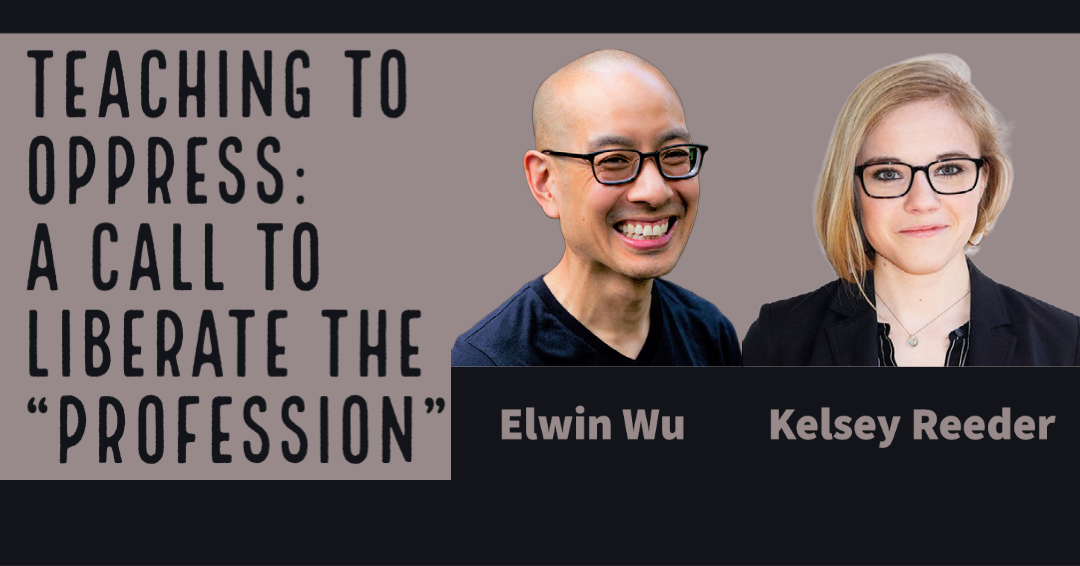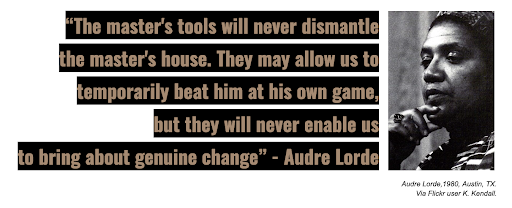From consent to engage to "rigor" versus liberation, Kelsey Reeder and Elwin Wu expand upon their conversation about social work and pedagogy on a recent podcast "Dead Ideas in Teaching and Learning."

Recently, Kelsey Reeder, a Clinical Social Worker and PhD student in Advanced Practice at Columbia University’s School of Social Work (CSSW), and Elwin Wu, Professor at CSSW and co-director of SIG, were guests on The Center for Teaching and Learning “Dead Ideas in Teaching and Learning” podcast. SIG asked them to share more about their experience and views on the education of social workers and the social work profession.
In the podcast, Kelsey and Elwin responded to questions around Beckie Supiano’s “Redefinition of Rigor.” Their responses offered ideas on how institutional teaching practices—like the emphasis on "rigor"—often disrupt movements towards community liberation.
The topic could not have been more timely. Amid recent calls to defund social workers in part for their role in policing, institutionalized and professionalized social work is facing a reckoning, as both Kelsey and Elwin share. Why do they specifically articulate "institutionalized and professionalized" when referring to social work? Because of the importance of identifying how social work is conceptualized. As noted in the podcast, understanding and conceptualization matters because white people and institutions have appropriated community-based networks of care to create systems that do more to police Black, Brown, disabled, trans, and queer people and communities than they have done to support the long practiced systems of care that have protected these groups before institutions began performing such care.
When it comes to liberating social work from its current institutional framing and structure, Kelsey is reminded of Audre Lorde’s instructive warning:

“The master's tools will never dismantle the master's house. They may allow us to temporarily beat him at his own game, but they will never enable us to bring about genuine change.” –Audre Lorde
Despite the podcast episode’s title “Rigor as Liberation” the two discuss how liberation—from forces like colonization, white supremacy, patriarchy, capitalism, and respectability politics—will not be achieved by reinforcing traditional institutional concepts such as rigor, a concept that evokes unbending, strict, and uncompromising practices and interactions. Nor is it achieved by a top-down approach of instructor informing student in what Paolo Friere of Pedagogy of the Oppressed and bell hooks of Teaching to Transgress referred to as the "banking system of education."
Rather, Kelsey believes “The work towards liberation is about both dismantling the institution and centering one’s body and community. Rigor, on the other hand, as a concept built within the institution, will always work to support and strengthen the institutions’ values—whether liberatory or not.”
Considering the historical legacy of institutional social work—what Chris Chapman and A.J. Withers refer to as A Violent History of Benevolence—Kelsey and Elwin often find themselves considering the implications of the colloquial phrase "caretaking." How does social work "take" in the name of care? Is care "giving" better? Social work is often framed as centering human well being. However, in practice the field can dominate people and communities rather than foster consensual care giving and receiving. Paraphrasing Elwin’s discussion of consent on the podcast, he noted that Kelsey’s call for "consent to engage" is ultimately about inclusion. Replacing "engage" with "inclusion" (versus "exclusion") more clearly illustrates how collective learning can occur when everyone is included. Caring, he says, will then emerge.
“The effort to make social work a profession is antithetical to care,” Elwin says. “It’s bondage.” Put this together with a teaching ethos devoted to rigor, future social workers will be trained to be unyielding in getting their clients to comply with the discipline of social work. On the other hand, professionalization helps ensure that the care and expertise–often by and of women and people of color–are recognized and compensated.
You might wonder if the field can liberate itself from this bind. “The word choice of 'discipline' and 'bondage' is intentional,” Elwin continues. “Perhaps a generative way forward is teaching and practicing social work in a way that is informed by kink and BDSM (bondage, discipline, sadism, and masochism)."
Kink practitioners have a history of leaning into—even deriving benefits from—power differentials by emphasizing responsibility and consent, such as the writer, creative, and pleasure doula Sara Elise shares in The Healing Benefits of Kink.
If you find this intriguing, more from Elwin, Kelsey, and other like-minded individuals who want to achieve more liberatory social work is forthcoming. Better yet, they invite you to join the scene. Feel free to follow SIG’s work (links to Twitter and Newsletter below) and Kelsey on Twitter.
-
Listen to the podcast episode.
-
Follow Kelsey Reeder on Twitter.
-
Follow SIG's work by signing up for our monthly newsletter or following us on Twitter.
